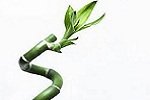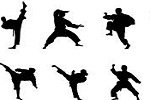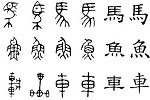Home ![]() Chinese Culture
Chinese Culture ![]() Chinese New Year Traditions
Chinese New Year Traditions
Chinese New Year Traditions
The Chinese New Year is also called Chinese Spring Festival. Chinese New Year traditions are important part of Chinese culture. If you want to understand Chinese people and their ways of living, these traditions offer a window to look into their lives.
The Chinese New Year holds the most significant position among all Chinese festivals and holidays. To better understand its importance, think about Christmas in the western world.
The Chinese New Year celebration lasts from January 1st to January 15th dated by the Chinese Lunar calendar, which is based on the phases of the moon. The Chinese New Year traditions unfold during this period of time, and the preparation may begin one month before the New Year's day.
The Chinese New Year traditions welcome and celebrate the beginning of a new year, and is the time to have big family gatherings. Family members visit each other at different days while New Year's Eve is the day that every family member gets together in the house where the most revered person is dwelling, normally a grandparent or parent.
During the days of visiting, gift giving and meal sharing and displaying of festive decorations are supposed activities. All focus on bringing good luck for the new year and celebrating the coming of Spring. If you are interested, here are some very common Chinese New Year symbols.
Cleaning the house
To better welcome the coming of the New Year, Chinese families clean every corner of their homes. It's usually done so thoroughly that even the top of the door will be dusted, and every linen is washed and dried prior to the first day of the New Year.
It is customarily believed that this thorough cleaning is to clear out any back luck from the previous year so that the house is ready for good luck of the coming new year. And on the first day of the New Year, nothing should be thrown out because the good luck might be taken out accidentally.
Wearing new clothes
During the Chinese Spring Festival, people like to wear new clothes, especially children. They are not just given red envelopes; they are also given new clothes to wear.
Red color is encouraged while black is forbidden, because black is associated with death and red is associated with warding off bad spirits. Chinese New Year is the time to have an auspicious beginning of a new year, so color matters.
Playing fireworks
To many, fireworks are the most fun part of the Spring Festival. The sound of fire crackers is heard during the whole cause of the Chinese New Year celebration and is loudest on New Year's eve when the old year is gone and the New Year is dawning. The whole country bursts with the thundering, joyful noise of fire crackers as every family participates.
Decorating the house
Like Christmas decoration to the western, one of the Chinese Spring Festival's traditions is to hang up Fu signs and spring couplets on doors, doorframes, walls and windows.
People also buy flowers with symbolic meanings for their home. The common flowers are plum blossoms and water narcissus. They are not chosen by accident. Click the links to see details.
Having big meals with family
One of the Chinese New Year traditions is to have family meals together to enjoy the family reunion. The meals are not just regular family meals, they're festival meals, meaning big meals.
The biggest meal is on the eve of the Chinese New Year. Traditional dishes are prepared and served. The meal normally is eight or nine dishes for a small family, because the two numbers are auspicious numbers, meaning prosperous and long-lasting respectively.
If you have a big family, just double or triple these numbers.
There are many Chinese New Year dishes with various styles. Some of the common food are Chinese dumplings, sticky rice cakes and tangerines. No matter what kind of dishes you have, they all have symbolic meanings.
Giving good luck gifts
During the Chinese Spring Festival, another Chinese New Year tradition is gift-giving. Normally the gifts should have symbolic meanings or carry good wishes like health, prosperity and happiness.
Hong bao, Lai-see or "red envelopes" are given to children by adults.
Making lanterns and having dragon parades
The end of the Chinese New Year's festivities falls on the fifteenth day of the new year. The Chinese New Year traditions on this day is to have Lantern Festivals in some areas, and dragon parades in others.
Families will light lanterns, which symbolize the brightness of spring. Lanterns are hung on walls around the house, or on poles to be carried in lantern parades.
Many areas have dragon parade. Dragon parades are spectacular. Chinese martial skills are used, and acrobatic talents are displayed. Some parade groups may dance in front of your house to give you good new year's wishes, and families usually come out to thank them with red envelopes.
Honor the zodiac year animal
There are some craft activities during the Chinese Spring Festival. One of the Chinese New Year traditions is to make paper cuts of the animal of the year as holiday decorations.
According to the Chinese calendar, there are 12 zodiac animals associated with each of the 12 Chinese years that repeat once every 12 years. People who are born in a certain year share the personality traits of that animal. Here is detailed information.
New Year's Eve
This is the time to have a big family reunion meal which is supposed to last until after midnight. According to the Chinese New Year tradition, it is a day to stay-up too. It's common that children take advantage of this legitimate opportunity to play all night, called Shou Sui.
Lighting firecrackers is also a very important activity for this night. It is believed since ancient time that the fireworks scare the bad luck away and celebrate the coming of good fortune. The louder and longer the firecrackers display, the better and luckier the year will be.
New Year's Day
New Year's day is a day to relax and have fun. Many people sleep because they stayed up from last year to this year. The kitchen is not busy at all, not just because there are lots of leftovers from the big-New-Year's-eve meal, but also because it's a Chinese New Year tradition.
According to Chinese legend, it is bad luck to use knives or scissors on New Year's Day as it may "cut off" your good fortune for the year.
Home ![]() Chinese Culture
Chinese Culture ![]() Chinese New Year Traditions
Chinese New Year Traditions

New York Pass With More than 50 Sttractions

Southern California CityPASS saves you 32% for Disneyland, Universal Studios and 3 other attractions











